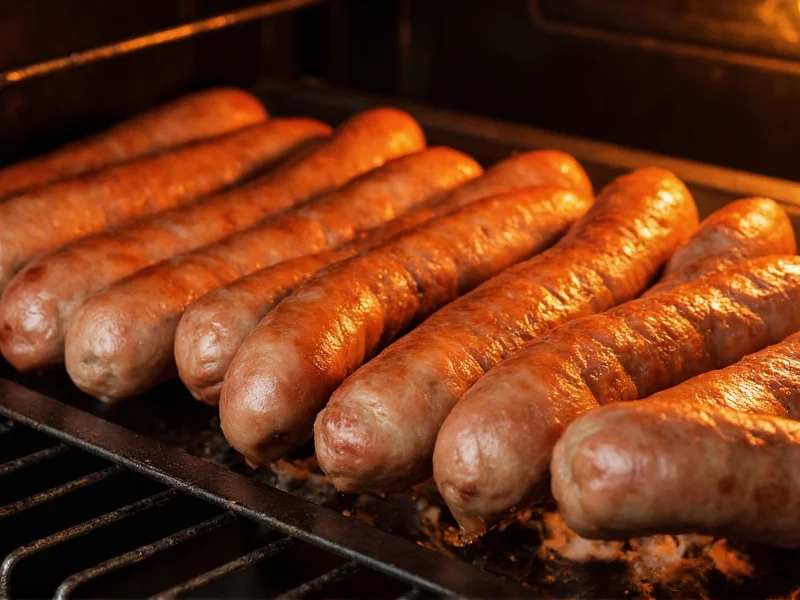Perfectly cooked sausage links make a versatile protein option for breakfast, lunch, or dinner. Baking them in the oven delivers consistent results with minimal effort compared to stovetop methods. This guide provides precise instructions for achieving golden-brown, juicy sausage links every time you use your oven.
Why Bake Sausage Links Instead of Other Methods?
Baking sausage links in oven offers several advantages over pan-frying or boiling. The dry heat environment creates even cooking without constant attention, reduces splatter mess, and develops a delicious caramelized exterior while maintaining moisture inside. Unlike boiling, which can leach flavor, oven baking concentrates the savory taste of quality sausage links.
Essential Equipment for Oven-Baked Sausage Links
You'll need minimal equipment to bake sausage links successfully:
- Rimmed baking sheet (18×13 inches works well)
- Parchment paper or silicone baking mat (optional but recommended)
- Metal spatula for turning
- Meat thermometer (critical for food safety)
- Tongs for handling hot sausages
Step-by-Step Baking Instructions
Follow these precise steps for perfectly baked sausage links:
- Preheat your oven to 375°F (190°C) with rack positioned in the center
- Line baking sheet with parchment paper to prevent sticking and simplify cleanup
- Arrange sausage links in single layer with space between each piece
- Place baking sheet in preheated oven
- Set timer for 10 minutes, then rotate sausages using tongs
- Continue baking for another 10-15 minutes until golden brown
- Check internal temperature reaches 160°F (71°C)
- Remove from oven and let rest 3-5 minutes before serving
| Type of Sausage Links | Oven Temperature | Total Baking Time | Internal Temp Target |
|---|---|---|---|
| Fresh pork sausage links | 375°F (190°C) | 20-25 minutes | 160°F (71°C) |
| Pre-cooked sausage links | 350°F (175°C) | 15-20 minutes | 140°F (60°C) |
| Frozen sausage links | 375°F (190°C) | 25-33 minutes | 160°F (71°C) |
| Turkey or chicken links | 375°F (190°C) | 18-22 minutes | 165°F (74°C) |
Pro Tips for Perfect Oven-Baked Sausage Links
Master the art of baking sausage links with these professional techniques:
- Don't overcrowd the pan - Leave at least 1 inch between links for proper air circulation and even browning
- Use a wire rack - Elevating sausages on a rack placed over the baking sheet creates all-around crispiness
- Rotate halfway - Ovens have hot spots; rotating the pan ensures uniform cooking
- Check early - Smaller links may cook faster; begin checking temperature at 15 minutes
- Rest before serving - Let sausages rest 3-5 minutes after baking to redistribute juices
Common Mistakes to Avoid When Baking Sausage Links
Prevent these frequent errors that lead to subpar results:
- Skipping the thermometer - Visual cues alone don't guarantee safe internal temperature
- Opening oven too frequently - Each peek drops oven temperature significantly
- Starting with cold sausages - Let refrigerated links sit at room temperature 15 minutes before baking
- Using too high temperature - 400°F+ causes casing to burst before interior cooks
- Not patting dry - Moisture on surface prevents proper browning
Serving Suggestions and Pairings
Baked sausage links pair beautifully with numerous sides and sauces. For breakfast, serve with eggs and roasted potatoes. At dinner, pair with sauerkraut and mustard or incorporate into pasta dishes. Try these creative serving ideas:
- Cut cooked links into bite-sized pieces for salads or pizza toppings
- Add to breakfast casseroles or stratas
- Serve with honey mustard dip for appetizers
- Chop and mix into stuffing for poultry
- Pair with roasted vegetables for a complete meal
Storage and Reheating Guidelines
Proper storage maintains quality of leftover baked sausage links. Cool completely within 2 hours of cooking, then store in airtight container in refrigerator for up to 4 days. For longer storage, freeze in portion-sized bags for up to 3 months.
Reheat in oven at 300°F (150°C) for best results - this preserves texture better than microwave reheating. Place sausages on baking sheet and heat 8-12 minutes until internal temperature reaches 140°F (60°C). For quick reheating, use air fryer at 320°F (160°C) for 5-7 minutes.
Frequently Asked Questions
Can I bake sausage links without thawing first?
Yes, you can bake frozen sausage links directly in the oven. Increase the baking time by 5-8 minutes compared to thawed links while maintaining the same 375°F temperature. Check internal temperature carefully as frozen centers may require additional time to reach safe 160°F.
How do I prevent sausage links from drying out in the oven?
To prevent dryness when baking sausage links, avoid temperatures above 375°F, don't overcook beyond recommended times, and let sausages rest 3-5 minutes after baking. Using a meat thermometer ensures you remove them at precisely 160°F rather than guessing. For extra moisture, place a small amount of broth or apple juice in the bottom of the baking pan.
What's the best way to get crispy sausage links in the oven?
For maximum crispiness when baking sausage links, preheat your oven thoroughly, use a wire rack over the baking sheet to allow air circulation, and avoid overcrowding. Pat sausages dry with paper towels before baking. For extra crispness, increase oven temperature to 400°F during the last 5 minutes of cooking, watching carefully to prevent burning.
Can I bake different types of sausage links together?
You can bake different sausage varieties together if they have similar thickness and required internal temperatures. Group pork and beef links together, and keep poultry sausages separate since they require higher internal temperature (165°F). If mixing types, arrange them on different sections of the baking sheet and check each type's temperature individually.











 浙公网安备
33010002000092号
浙公网安备
33010002000092号 浙B2-20120091-4
浙B2-20120091-4